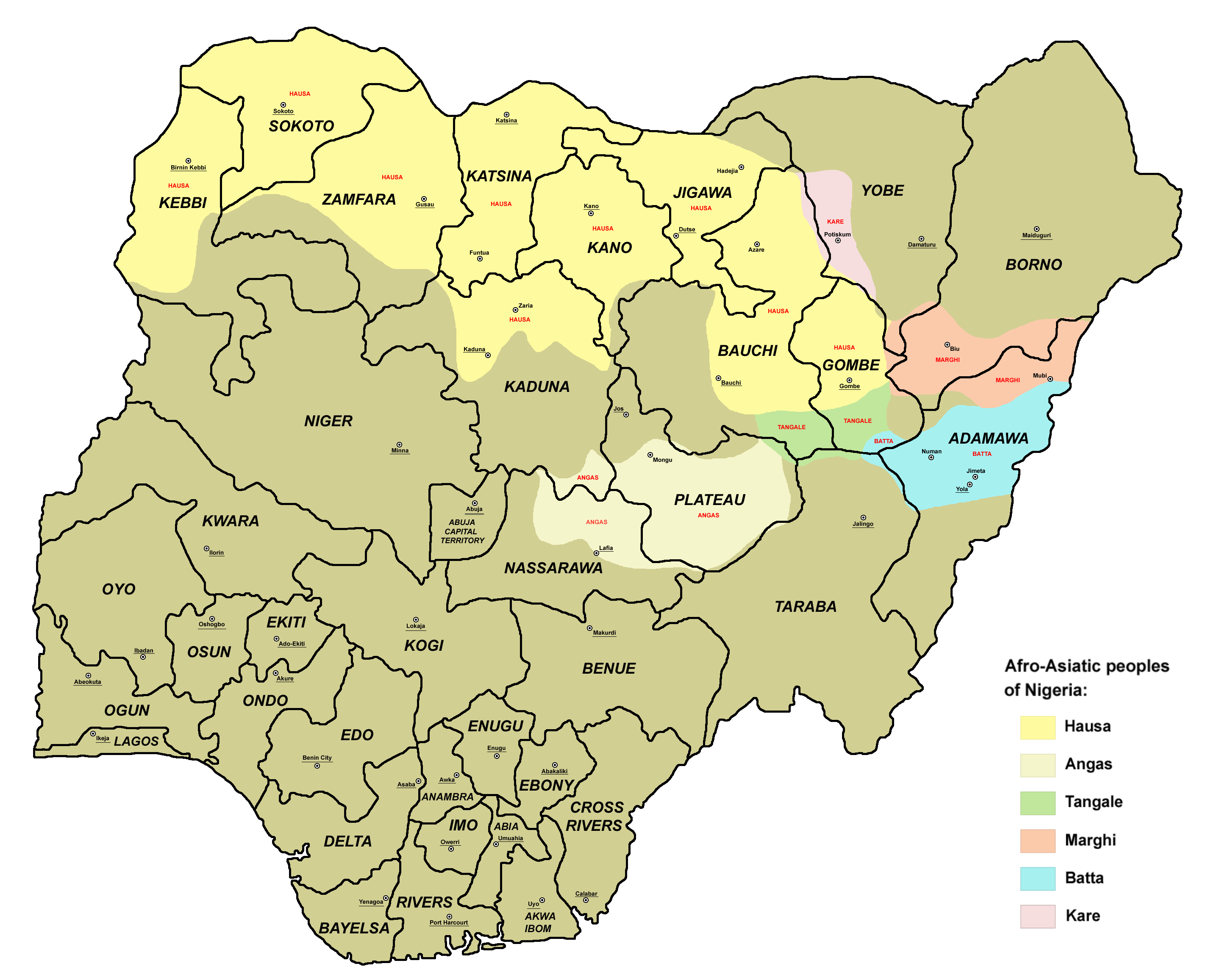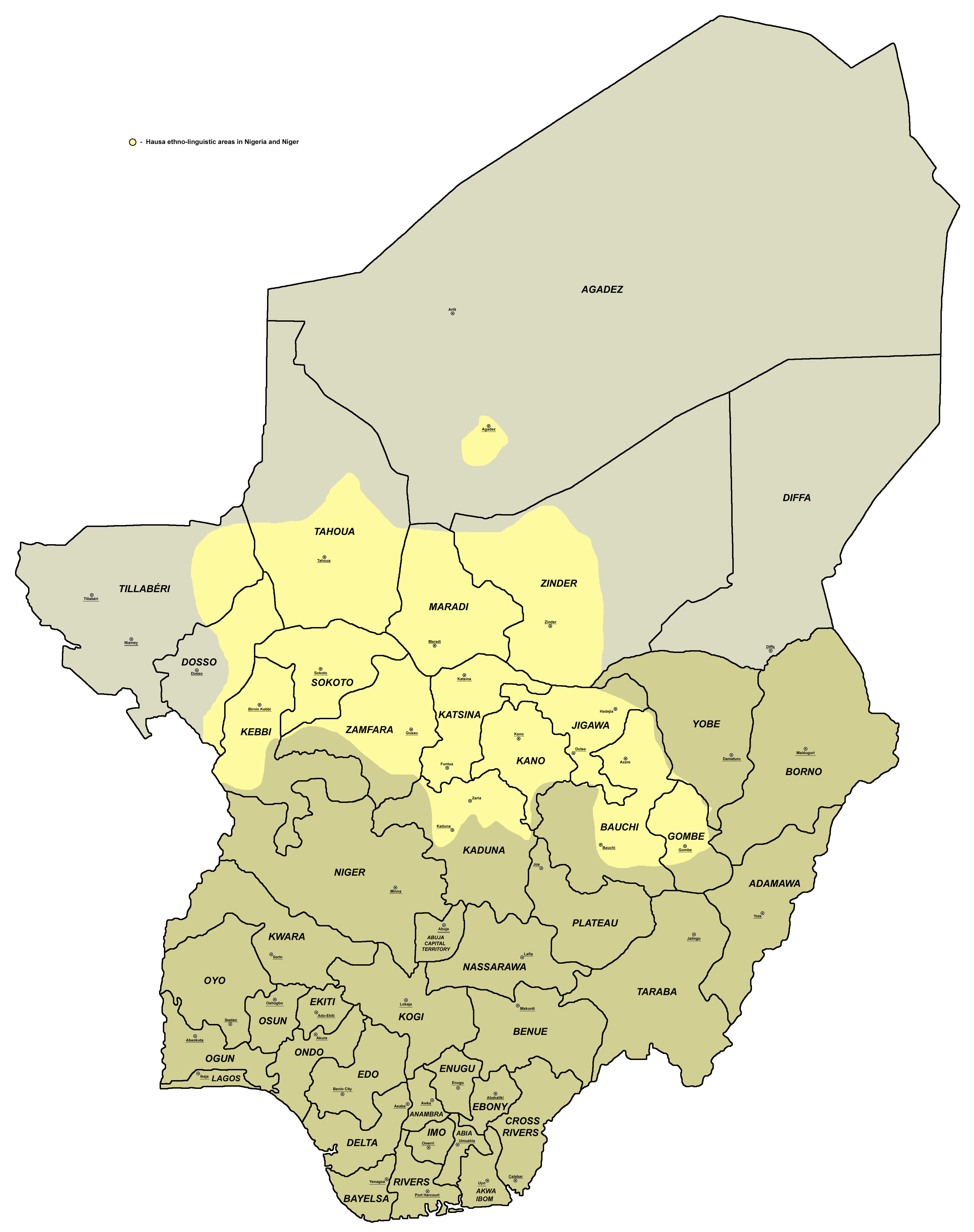|
Zari Language
Zari (Zariwa) is a Chadic dialect cluster A dialect continuum or dialect chain is a series of language varieties spoken across some geographical area such that neighboring varieties are mutually intelligible, but the differences accumulate over distance so that widely separated varie ... of Nigeria. Blench (2019) lists varieties as Zari, Zakshi, and Boto. Although there is an ethnic population of about 20,000, the last speaker had already died by 2000 (Campbell and Belew 2018). References Chadic languages {{Nigeria-stub ... [...More Info...] [...Related Items...] OR: [Wikipedia] [Google] [Baidu] |
Bauchi State
Bauchi State (Fula: ''Leydi Bauchi'' 𞤤𞤫𞤴𞤣𞤭 𞤦𞤢𞤵𞤷𞥅𞤭) is a state in the North-East geopolitical zone of Nigeria, bordered by Kano and Jigawa to the north, Taraba and Plateau to the south, Gombe and Yobe to the east, and Kaduna to the west. It takes its name from the historic town of Bauchi, which also serves as its capital city. The state was formed in 1976 when the former North-Eastern State was broken up. It originally included the area that is now Gombe State, which became a distinct state in 1996. Of the 36 states, Bauchi is the fifth largest in area and seventh most populous with an estimated population of over 6,530,000 as of 2016. Geographically, the state is divided between the West Sudanian savanna in the south and the drier, semi-desert Sahelian savanna in the north with a small part of the montane Jos Plateau in the southwest. A key defining characteristic of the state’s landscape is Yankari National Park, a large wildlife park ... [...More Info...] [...Related Items...] OR: [Wikipedia] [Google] [Baidu] |
Plateau State
Plateau State is the twelfth-largest Nigerian state. It is in the centre of the country includes a range of hills surrounding the Jos Plateau, its capital, and the entire plateau itself. Plateau State is described as "The Home of Peace and Tourism". With natural formations of rocks, hills and waterfalls, it derives its name from the Jos Plateau and has a population of around 3.5 million people. Geography Adjacent states * Bauchi State – to the north east * Kaduna State – to the north west * Nasarawa State – to the south west * Taraba State – to the south east Boundaries Plateau State is located in the North Central Zone out of the six geopolitical zones of Nigeria. With an area of 26,899 square kilometres, the state has an estimated population of about three million people. It is located between latitude 8°24' N and 10°30' N and longitude 8°32' E and 10°38' E. The state is named after the Jos Plateau, a mountainous area in the north of the sta ... [...More Info...] [...Related Items...] OR: [Wikipedia] [Google] [Baidu] |
Chadic Languages
The Chadic languages form a branch of the Afroasiatic language family. They are spoken in parts of the Sahel. They include 150 languages spoken across northern Nigeria, southern Niger, southern Chad, the Central African Republic, and northern Cameroon. The most widely spoken Chadic language is Hausa, a ''lingua franca'' of much of inland Eastern West Africa. Composition Paul Newman (1977) classified the languages into the four groups which have been accepted in all subsequent literature. Further subbranching, however, has not been as robust; Roger Blench(2006), for example, only accepts the A/B bifurcation of East Chadic. Kujargé has been added from Blench (2008), who suggests Kujargé may have split off before the breakup of Proto-Chadic and then subsequently became influenced by East Chadic. Subsequent work by Joseph Lovestrand argues strongly that Kujarge is a valid member of East Chadic. The placing of Luri as a primary split of West Chadic is erroneous. Bernard Caron (200 ... [...More Info...] [...Related Items...] OR: [Wikipedia] [Google] [Baidu] |
West Chadic Languages
The West Chadic languages of the Afro-Asiatic family are spoken principally in Niger and Nigeria. They include Hausa, the most populous Chadic language and a major language of West Africa. Languages The branches of West Chadic go either by names or by letters and numbers in an outline format. * Hausa–Gwandara (A.1): Hausa, Gwandara *Bole–Angas (?) ** Bole–Tangale (A.2) ***North (Bole proper): Bure, Karekare, Bole, Gera, Geruma, Deno, Galambu, Giiwo, Kubi, Ngamo, Maaka (Maagha), Ɓeele, Daza (Dazawa), ?Pali ***South (Tangale): Kwaami, Pero, Piya-Kwonci, Kholok, Nyam, Kushi (Goji), Kutto (Kupto), Tangale, Dera (Kanakuru) ** Angas ( Central West Chadic) (A.3)Blench, Roger. 2017Current research on the A3 West Chadic languages ***Ngasic: Ngas (Angas), Belnəng ***Mwaghavulic: Mwaghavul, Mupun (Mapun), Takas (Toos); Cakfem-Mushere *** Miship (Chip) ***Pan cluster **** Chakato/Jorto **** Jipal, Mernyang (Mirriam), Kwagallak, Kofyar (Doemak), Bwol, Gor ... [...More Info...] [...Related Items...] OR: [Wikipedia] [Google] [Baidu] |
Barawa Languages
The South Bauchi languages (also called the B.3 West Chadic or Barawa languages) are a branch of West Chadic languages that are spoken in Bauchi State and Plateau State, Nigeria. An extensive lexical survey of the South Bauchi languages had been carried out by Kiyoshi Shimizu from 1974 to 1975.Shimizu, Kiyoshi. 1978. ''The Southern Bauchi group of Chadic languages: a survey report''. (Africana Marburgensia: Sonderheft, 2.) Marburg/Lahn: Africana Marburgensia. 48pp. Another early survey was that of Gowers (1907), which included 42 languages of Bauchi. Languages The South Bauchi languages include: ;South Bauchi languages *Zaar group: Dass; Geji, Polci (Polchi), Saya, Zari, Zeem *Guruntum group: Guruntum-Mbaaru, Ju, Tala, Zangwal *Boghom group: Jimi, Jum; Boghom, Kir-Balar, Mangas Roger Blench (2020) counted around 38 South Bauchi languages. Internal classification Shimizu (1978) Shimizu (1978) classifies the South Bauchi languages as follows. Individual languages ... [...More Info...] [...Related Items...] OR: [Wikipedia] [Google] [Baidu] |
Zaar Languages
The South Bauchi languages (also called the B.3 West Chadic or Barawa languages) are a branch of West Chadic languages that are spoken in Bauchi State and Plateau State, Nigeria. An extensive lexical survey of the South Bauchi languages had been carried out by Kiyoshi Shimizu from 1974 to 1975.Shimizu, Kiyoshi. 1978. ''The Southern Bauchi group of Chadic languages: a survey report''. (Africana Marburgensia: Sonderheft, 2.) Marburg/Lahn: Africana Marburgensia. 48pp. Another early survey was that of Gowers (1907), which included 42 languages of Bauchi. Languages The South Bauchi languages include: ;South Bauchi languages *Zaar group: Dass; Geji, Polci (Polchi), Saya, Zari, Zeem *Guruntum group: Guruntum-Mbaaru, Ju, Tala, Zangwal *Boghom group: Jimi, Jum; Boghom, Kir-Balar, Mangas Roger Blench (2020) counted around 38 South Bauchi languages. Internal classification Shimizu (1978) Shimizu (1978) classifies the South Bauchi languages as follows. Individual languages a ... [...More Info...] [...Related Items...] OR: [Wikipedia] [Google] [Baidu] |
Chadic Language
The Chadic languages form a branch of the Afroasiatic language family. They are spoken in parts of the Sahel. They include 150 languages spoken across northern Nigeria, southern Niger, southern Chad, the Central African Republic, and northern Cameroon. The most widely spoken Chadic language is Hausa, a '' lingua franca'' of much of inland Eastern West Africa. Composition Paul Newman (1977) classified the languages into the four groups which have been accepted in all subsequent literature. Further subbranching, however, has not been as robust; Roger Blench(2006), for example, only accepts the A/B bifurcation of East Chadic. Kujargé has been added from Blench (2008), who suggests Kujargé may have split off before the breakup of Proto-Chadic and then subsequently became influenced by East Chadic. Subsequent work by Joseph Lovestrand argues strongly that Kujarge is a valid member of East Chadic. The placing of Luri as a primary split of West Chadic is erroneous. Bernard Caron (2 ... [...More Info...] [...Related Items...] OR: [Wikipedia] [Google] [Baidu] |
Dialect Cluster
A dialect continuum or dialect chain is a series of language varieties spoken across some geographical area such that neighboring varieties are mutually intelligible, but the differences accumulate over distance so that widely separated varieties may not be. This is a typical occurrence with widely spread languages and language families around the world, when these languages did not spread recently. Some prominent examples include the Indo-Aryan languages across large parts of India, varieties of Arabic across north Africa and southwest Asia, the Turkic languages, the Chinese languages or dialects, and subgroups of the Romance, Germanic and Slavic families in Europe. Leonard Bloomfield used the name dialect area. Charles F. Hockett used the term L-complex. Dialect continua typically occur in long-settled agrarian populations, as innovations spread from their various points of origin as waves. In this situation, hierarchical classifications of varieties are impractical. Inst ... [...More Info...] [...Related Items...] OR: [Wikipedia] [Google] [Baidu] |
Nigeria
Nigeria ( ), , ig, Naìjíríyà, yo, Nàìjíríà, pcm, Naijá , ff, Naajeeriya, kcg, Naijeriya officially the Federal Republic of Nigeria, is a country in West Africa. It is situated between the Sahel to the north and the Gulf of Guinea to the south in the Atlantic Ocean. It covers an area of , and with a population of over 225 million, it is the most populous country in Africa, and the world's sixth-most populous country. Nigeria borders Niger in the north, Chad in the northeast, Cameroon in the east, and Benin in the west. Nigeria is a federal republic comprising of 36 states and the Federal Capital Territory, where the capital, Abuja, is located. The largest city in Nigeria is Lagos, one of the largest metropolitan areas in the world and the second-largest in Africa. Nigeria has been home to several indigenous pre-colonial states and kingdoms since the second millennium BC, with the Nok civilization in the 15th century BC, marking the first ... [...More Info...] [...Related Items...] OR: [Wikipedia] [Google] [Baidu] |




